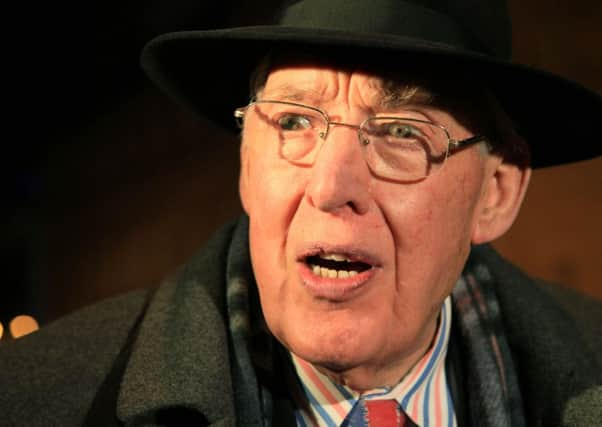Dani Garavelli: Ian Paisley never a man of peace


In our appraisal of Paisley’s legacy, we seem to be expected to take our lead from former IRA commander-turned-politician Martin McGuinness, who last week fought back tears as he talked of the loss of the former First Minister who became a friend. The nauseating “Chuckle Brothers” relationship McGuinness forged with his former enemy as they shared power at Stormont is hailed as evidence of how the No-man of Northern Irish politics had mellowed and promoted harmony in his twilight years. But why wouldn’t McGuinness and Paisley have got on? As fundamentalists, they had much in common: an unshakable faith in their own rightness, a reckless disregard for consequences and a reluctance to compromise. Throughout the Troubles, they enjoyed a symbiotic relationship, each acting as the other’s best recruitment agent. And in the end, they both grabbed personal power out of the embers of the bonfire they had ignited.
It is surely not McGuinness, but Northern Ireland’s moderates – those who found their every attempt to find a peaceful solution thwarted by Paisley’s finger-wagging intransigence – who are best placed to appraise his legacy; and their verdict is less flattering. Yes, the “big man” did eventually agree to work constructively with Sinn Fein (just a year after saying such an arrangement would take place over his dead body). But it took him until 2007 to do so – almost a decade after the signing of the Good Friday agreement, an agreement which, if Paisley had had his way, would never even have existed. And even then, his critics say, he relented not out of any great concern for the future of Northern Ireland, but because it was the only way to retain a semblance of credibility, the only way he could fulfil his political ambition.
Advertisement
Hide AdAdvertisement
Hide AdIn the intervening period, he did his best to stand in the way of progress. My abiding memory of the year-and-a-half after the Good Friday Agreement was signed, when I spent much time in Belfast, was of Ulster Unionist leader David Trimble working tirelessly to advance the process, while trying keep the more volatile elements of his own party on board. And of Paisley, like a pantomime villain, on the sidelines, shouting No at every juncture.
For the first 82 years of his life, Paisley stood for nothing more than hate: he hated gays (leading Save Ulster from Sodomy); he hated Catholics (“they breed like rabbits and multiply like vermin”); he hated line-dancing. In his outlook, he was not dissimilar to former Westboro Baptist Church preacher Fred Phelps and over time his face set into a mask of intolerance and contempt that outlived his belated change of heart. On occasion, Paisley exported this hatred to our shores. In solidarity with his Scottish mini-me, Pastor Jack Glass, he protested against the visit of Pope John Paul II at Glasgow’s Bellahouston Park in 1985.
Paisley split his church (he broke away from the Presbyterian Church to form the Free Presbyterian Church) and he split his party (he broke away from the Protestant Unionist Party to form the Democratic Unionist Party). Many believe his opposition to the civil rights movement’s demands for change in the 60s helped create the Troubles and he stood in the way of every attempt to end them; he helped bring down both the Sunningdale Agreement of 1974 and the Anglo-Irish agreement of 1985. And his condemnation of terrorism was disingenuous; even if he never dirtied his own hands, he incited it and he exploited it, relying on Loyalist paramilitaries to enforce the Ulster Workers’ Council strike which scuppered Sunningdale.
Paisley didn’t join the Orange Order; some said he didn’t want to be part of any organisation unless he could lead it. But last week grand master of the Grand Lodge of Northern Ireland described him as a firm supporter and friend of the institution.
Now, once again, Paisley is proving a divisive force. The timing of his death, combined with the Orange Order rally in Edinburgh, has been a blow for the Better Together campaign. The footage of him barking “No” and “Never, Never, Never” - which has been repeated on a loop on the TV news for days – has interfered with its attempts to strip the word of its negativity. To have that negativity linked with the pro-Union cause by Orange marchers, some of them from Ulster, so close to the vote is at best unfortunate, at worst disastrous. And yet Better Together cannot be seen to rebuff an organisation which is rallying to its side.
That “Never Never Never” speech – given in 1985 at Belfast City Hall – will be Paisley’s defining moment in the public consciousness, if not in the newspaper obituaries. He may eventually have been instrumental in moving Northern Ireland forward, but only in the sense that – right up until the moment he changed his position – he was the principal obstacle holding it back. For all his supposed private charisma, Paisley fomented discord for more than half a century and his pragmatic, last-to-the-table commitment to peace could do little to redeem him. «
Twitter: @DaniGaravelli1
SEE ALSO